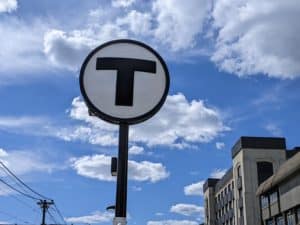The head of the MBTA’s oversight board came under strong criticism from one of the state’s top business leaders for declaring that the transit service’s still-low ridership levels represent a “new normal”
During a regular meeting of the T’s board, chair Betsy Taylor responded to a presentation about ridership patterns and its impact on T finances by saying, “I personally think that where we are is the new normal.”
Taylor’s reaction drew fire from Greater Boston Chamber of Commerce President and CEO James Rooney, who pointedly noted that the region’s workers and businesses “depend on the MBTA every day.”
“Our ability to solve congestion, housing, climate change, economic equity, and other major public policy issues depend on having a safe, reliable transit system. The latest comment from the T board chair that reduced ridership levels is the ‘new normal’ is disappointing and frustrating,” Rooney said in a statement issued by the Chamber Thursday afternoon. “A successful business or government agency culture is built on resilience, agility, and optimism – not despair to current challenges. Instead of being a victim, the leaders at the MBTA need to offer ridership goals, a strategy, and strong results. The people of the Commonwealth – the T’s riders – and the T’s workforce deserve inspirational leadership and a safe, reliable, and accessible MBTA.”
A few hours later, the T announced drastic speed restrictions on all four subway lines “out of an abundance of caution,” without specifying why. More details are expected to be announced at a 10 a.m. press conference Friday.
The T’s subway system is currently carrying only 51 percent of pre-pandemic riders, 12 percentage points below the T’s worst-case scenario model according to the T’s presentation Thursday. Bus ridership has bounced back to 72 percent of pre-pandemic ridership, but still lagging forecasts.
Other transit agencies around the country also continue to struggle with lost ridership that’s partly blamed on long-term changes to work patterns in the white-collar world.
But transit observers and advocates pointedly note that, since the pandemic, T managers have chosen to run worse and less frequent service, particularly on the subway system. This has been compounded by staff shortfalls partly driven by a pandemic hiring freeze, a contract for bus drivers that advocates say isn’t competitive with even low-skilled work and a wave of retirements. The result: a system that leaves riders stuck with long waits, random disruptions and maintenance shutdowns, encouraging many to find other ways to get around despite world-leading traffic congestion.
The T is operating without a permanent general manager as Gov. Maura Healey’s search for that person, which began in December, continues. Longtime deputy GM Jeff Gonneville currently holds the top job on an interim basis.
Healey also pledged in her inaugural address to hire a new transportation safety chief by March 6 to address issues across different modes, and that person has not yet been announced.
“It’s just the process. It’s a process where we want to find the very best people to fill these jobs, both the GM position and the transportation safety chief position,” Healey told reporters on Wednesday. “We are well on our way through that process, and I hope to have announcements very soon, but I think the process has taken the time necessary in order to make sure that we’re getting the very best talent here into the state.”
She added that she expects to make an announcement in “days, not weeks.”
Material from State House News Service was used in this report.







